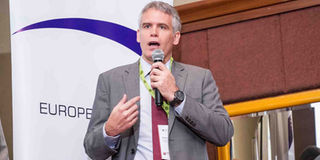EU sets Shs429b to support green economy in Uganda

Head of section Economic Growth at the European Union office in Uganda Cedric Merel. COURTSEY PHOTO
What you need to know:
- Factors. Human activities such as industrialisation are changing climatic patterns globally.
Kampala. To help Uganda develop enterprises that do not destroy the environment, the European Union (EU) has announced financial support of Euros 100 million (Shs429 billion) for the next three years.
Human activities such as industrialisation are changing climatic patterns globally more so in developing countries.
As such global climate is projected to continue to change over this century and beyond.
Scientists and economists say the magnitude of climate change beyond the next few decades depends mainly on the amount of heat-trapping gases emitted globally, and how sensitive the earth’s climate is to those emissions.
Speaking in Kampala on Tuesday during SEED East Africa symposium/award giving ceremony for innovative locally-led start up enterprises, the head of corporation at the European Union office in Uganda, Mr Cedric Merel, said: “In Uganda, an illustration of the EU’s commitment is provided by the earmarking of no less than 100 million for supporting inclusive green economy in the years to come.”
He added: “While the specific interventions to be financed are still to be identified, the move will no doubt fully support the soon-to -be launched Uganda Green Growth Economy Development Strategy – a strategy that we understand considers articulating green development along five strategies.”
The five strategies are: sustainable agriculture production for example value chains, irrigation, soil fertility, natural capital management and development like tourism, wildlife,
There is also sustainable forestry, sustainable wetlands, watershed management, plan green cities for example waste management, sustainable transport and energy for sustainable livelihoods and development.
“A key concern for us is to finance projects that are: more inclusive amongst others for women, the youth and refugees/host communities and more integrated ...” Mr Merel explained.
To achieve the these goals, he said the EU plans to make use of financing instruments designed to support access to finance, help make projects bankable and help make the economic environment more conducive to business.
SWITCH Africa initiative
In a speech read for her by Mr Wilson Kwamya, the team leader Inclusive Green Growth, the UN resident coordinator|UNDP resident representative, Ms Rosa Malango said: “This is the reason why UNDP supports the SWITCH Africa Green initiative now operational in six countries; Burkina Faso, Ghana, Kenya, Mauritius, South Africa and Uganda.”
She said the objective of this initiative is to help these nations transition towards a private sector-led inclusive green economy, based on sustainable consumption and production patterns in line with Sustainable Development Goals; 12, 13, 14 and 15.


